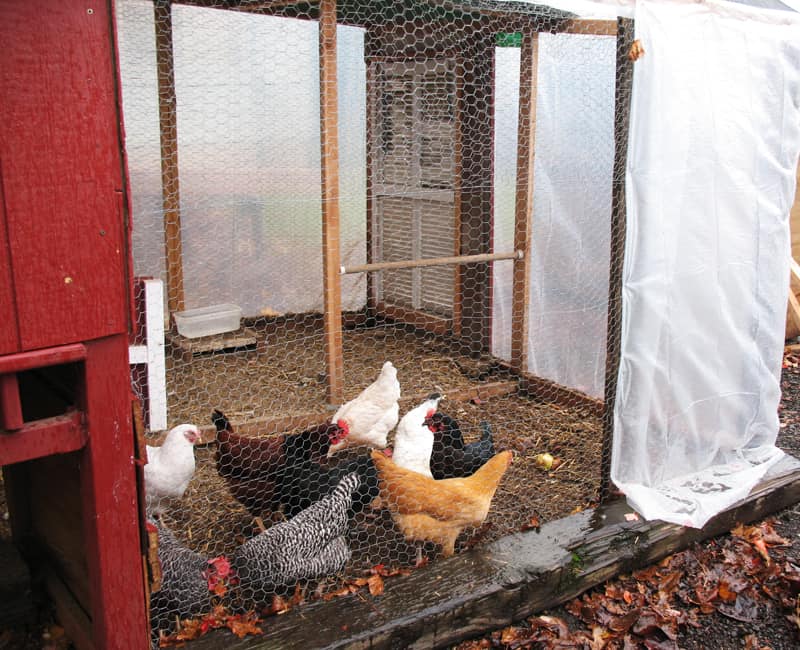
Taking care of your chickens in winter isn’t a hard task as long as you do a bit of planning.
Keeping a small flock of chickens in your backyard means they will need some extra attention to make it through the winter safe, healthy, happy and warm. Where many large scale farmers might not go to the extra work to pamper their chicks, small flock farmers need to remember that a handful of chickens produce much less collective body heat than a large flock of 50 or more chickens. (You can tell if your chickens are cold if they fluff their feathers and stand on one foot. They are trying to stay warm.) A little preparation will go a long ways in avoiding chicken problems.
To help your chickens in winter, here are a few things for you to consider:
Add Light
If you live in extreme climates, adding a heat lamp* is a way to keep your chickens warmer. Besides taking the chill off the coop, your chicken’s egg production will increase (as chickens like to have about 14 hours of daylight for optimal egg laying conditions).
A neat little thing you can add to your coop (for less than $15) is a controlled outlet that automatically turns your light on when the temperature dips below 35, and turns it back off when it gets above 45.
Add Insulation
Chicken coop insulation can be as easy (and cheap) as sheets of foam or cardboard. I insulated my coop using scraps leftover from cull bin at a home improvement store. It cost me less than $25 to insulate my entire coop this way. If using insulation, remember to cover it up. Chickens love to peck at anything, whether good for them or not. But, it does help keep them warm.
Patch up Holes
If your coop is drafty or has lots of open spaces, consider covering them up for the winter. Leave some ventilation because they still need some fresh air, even in the winter.
P.U.P.
Yes, this is an acronym for doggie poop patrol, but it works for chickens too. Pick Up Poop. Cleaning the coop out still needs to happen in the winter. Chickens to stay indoors more in the winter, and if you close up the coop more than it is in the summer, all that smell can start to bother their lungs. Sanitary chicken environment is a must.
Keep Water Drinkable
If freezing water is a problem where you live, consider getting a heater for the water. They actually make heaters for chicken water containers. Tuck it inside your water container, or sit the container on top (depending on the style you get) and it will keep the water from freezing. You can do something similar with a heated dog water dish (which is actually a cheaper option). Water is as essential to chickens in winter as in any other season. Or, even cheaper yet, make your own water heater for just a few dollars and a couple of minutes time.

Add Plastic
Chickens like to be dry and protected from the wind. Adding plastic (or a tarp or a shower curtain, etc.) to the outside of the chicken run will cut down on those things significantly.
I used a roll of 7ml clear plastic and stapled it up on 2 of the 3 walls of the chicken run (almost all our winter wind comes from the northeast so I blocked wind from that direction). They still have one wall uncovered so they can see out and get fresh air. As soon as it warms up in the spring, I take the plastic off.
Add Entertainment
Chickens need exercise, especially in the winter when they are less likely to be roaming around, so give them incentive to exercise. Throw cracked corn or other grains into the chicken run and let them scratch around for it. Put their food and water containers at opposite ends of the coop so they have to walk from one place to the other. (Another great thing about chicken scratch is that it heats up their body temperature which will help keep them warm. Also, it will help add another layer of fat to their bodies for a bit more insulation on those cold nights.)
Giving your chickens something to do this winter will also cut down on them picking on each other out of boredom or grouchiness from being cooped up. Get a whole cabbage and drill a hole through it, run a rope through it and hang it just out of the reach of your chickens. They will jump up at it, tearing bits off and eating it. Not only is it nice to have fresh vegetables to feed them, they will get their exercise as well (Would you like to see pictures of how I did this?)
Add Bedding
In the winter months, add extra bedding to the coop and nest boxes. If you live in a cold region, add extra straw. If you live in a warmer region, add extra wood shavings or wood pellets (I use a combination of wood shavings and wood pellets and it seems to work great).
Paying attention to some of these details will help ensure your chickens survive the cold weather. As in most things with these easygoing birds, just a little effort will keep them healthy and happy. They will appreciate the extra pampering, and may even reward you with some eggs. Even in the cold winter!
*A while back two chicken coops in my area caught on fire the same weekend due to heat lamps in their coops. Apparently the temperature for the fixtures of those lights can get as high as 500 degrees. The fire fighter interviewed in the article (who helped put the fires out) said that a 100 watt lightbulb should do the trick for most city coops with small flocks, greatly reducing the danger and the heat..(Would you like to read the article?)